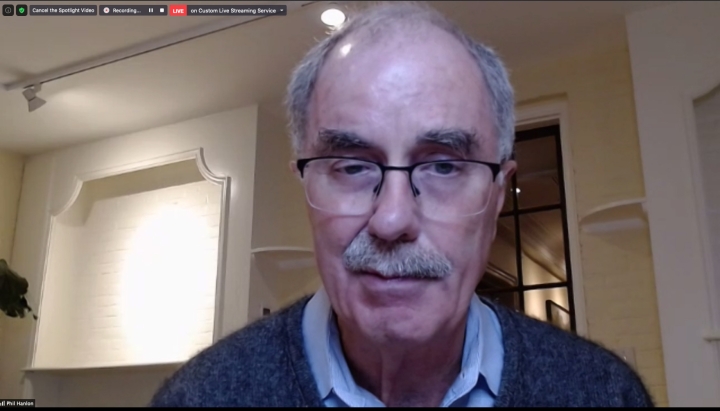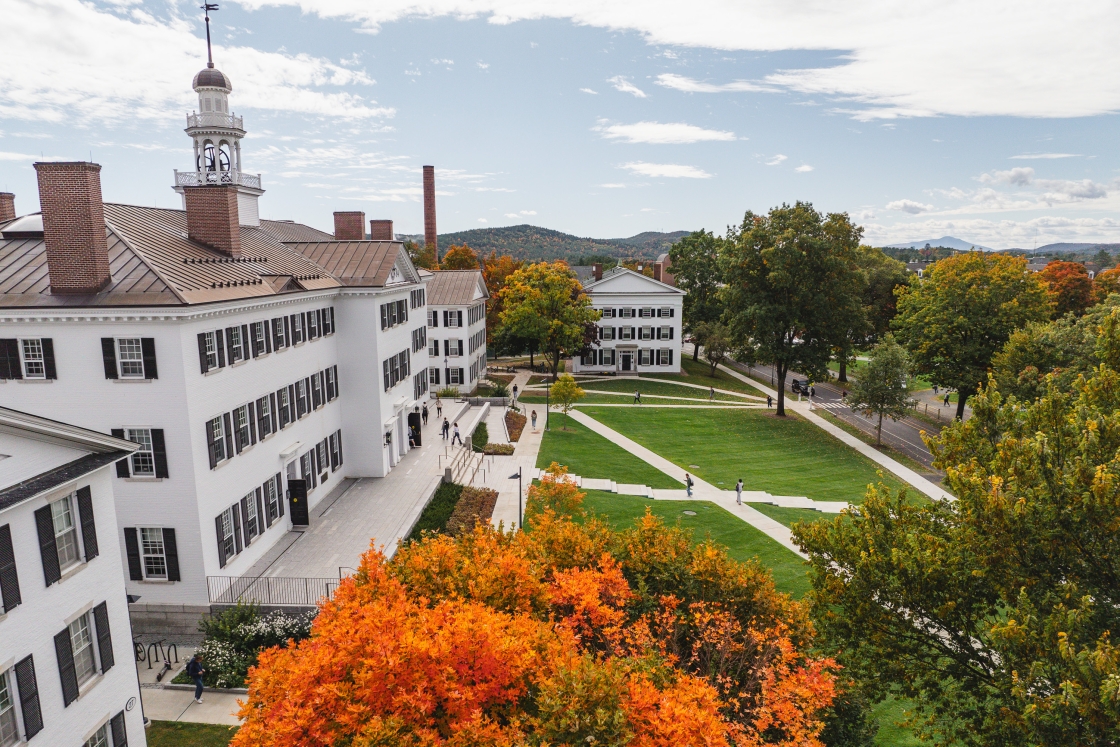President Philip J. Hanlon ’77 returned as a guest on this week’s Community Conversations webcast, speaking with Provost Joseph Helble about the challenges of leading Dartmouth during a global pandemic, reexamining processes related to COVID-19, and lessons learned from the past nine months. The two fielded viewers’ questions in a conversation moderated by Vice President for Communications Justin Anderson.
Helble provided an update on Dartmouth’s fall operations, which he said have successfully kept the community healthy even as the nation is experiencing a spike in COVID-19 cases. The success is due to the way the community has complied with mask-wearing, physical distancing, hygiene rules, and COVID testing protocols, he said.
“As of yesterday, Dartmouth had conducted some 43,000 surveillance tests over the course of the fall term,” Helble said. “Think about the scale of that operation for a moment. That is a testing center set up on campus that is seamlessly processing nearly 1,000 tests per day, consistently throughout the entire term.”
For last Tuesday’s election, the testing center at Leverone Fieldhouse was transformed into a polling station, and transformed back into a testing facility by Wednesday morning.
“This partnership with the town of Hanover was essential for allowing the vote to take place in this COVID year in an orderly and safe way,” Helble said. “As Hanover town officials told us yesterday, you were outstanding. The community of Hanover thanks you.”
As the COVID-19 task force members look ahead to winter, they “will be examining our fall term operations and policies, asking what has worked well, and considering what we might change for winter term,” Helble said.
In particular, they are looking for ways to increase students’ access to indoor spaces, such as Dartmouth Library’s Baker-Berry Library, and “to develop additional opportunities that encourage our students to get outside during the winter. Not to tolerate it, but to embrace it,” Helble said.
Helble acknowledged that some this fall have had “questions about policies that have resulted in some students being asked to move out of the residence halls, and policies that place fairly tight boundaries on allowable travel.”
While students are expected to adhere to the community expectations agreement they signed at the beginning of the term, Helble said, “We are looking at our processes and asking whether there are things we might adjust during winter term to provide more clarity around allowable travel and around those levels of infraction that result in a loss of residential privilege.”
Several student groups have been instrumental in this conversation, he said, including the student advisory board providing input to the dean of the College, student assembly, undergraduate advisers, other campus leaders, and first-year student focus groups convened by the Office of Student Affairs.
The online forum, designed to let community members hear directly from campus and community leaders about Dartmouth’s priorities, decisions, and operations during the pandemic, aired this week on Veterans Day. Both President Hanlon and Helble offered messages to those in the Dartmouth community who have served.
“I have great respect and admiration for every veteran and appreciation for their sacrifice and commitment to our country, so bravo to all veterans,” Hanlon said. “Veterans bring important perspectives and a very distinct set of experiences to our community, which adds value to all of our teaching and learning.”
Leadership in the Age of COVID
Asked to compare leading Dartmouth through the pandemic to other challenges in his career, Hanlon said, “It’s much more complicated than anything I’ve encountered before, for a few reasons. Number one, there’s no playbook—none of us has experienced anything like this in our lifetimes. So I can’t look back a couple of decades and say, ‘What did we do back then?’ Second, we don’t have one challenge—we have three simultaneous challenges. One is keeping the campus healthy; then, carrying out our mission in view of that; and then, dealing with the financial fallout from COVID.”
But, he said, “We are getting through this as a community, coming together around hard work and shared sacrifice.”
Among the fiscal challenges, “financial aid applications have skyrocketed since the pandemic began, because so many Dartmouth families have had their circumstances change,” Hanlon said. He noted that financial aid was a major goal of the Call to Lead capital campaign well before the pandemic began.
“We believe diversity of background and experience brings value to our campus, and that includes socioeconomic diversity. So we want to make sure that we have the resources available so that any student admitted is able to attend, regardless of financial circumstances,” the president said.
Because COVID-19 has made this goal even more urgent, Hanlon has established the Presidential Commission on Financial Aid, composed of alumni and parents who are helping Dartmouth develop strategy, craft messages, and “carry the message, themselves, directly to our alumni base.”
“It’s always been the case with Dartmouth that each generation makes sure that the next generation can succeed,” Hanlon said. “This is an instance where we’re asking the alumni community to step up.”
Lessons Learned: The Future of Teaching and Learning
Asked if the experience of remote learning this past year will permanently change Dartmouth’s educational model, Hanlon said, “COVID hasn’t set a new direction, it’s accelerated trends that were already there.”
What will this mean for Dartmouth? “First, I think that our faculty will adopt more widely the best of online teaching,” he said—for instance, bringing more outside experts into classrooms and activities at Dartmouth’s centers via Zoom, including, among others, CNN’s Jake Tapper ’91 and former N.H. Sen. Judd Gregg.
Dartmouth may also “explore what we might offer the world in the non-degree space and in an expanded set of hybrid masters programs,” Hanlon said.
“And lastly, what does Dartmouth bring to the table? We actually bring a powerhouse. Our expertise and teaching combined with the reach of online instruction is just flat-out a powerhouse. We have lots of opportunities ahead of us.”
A professor of mathematics, Hanlon has continued to teach graduate students and undergraduates during the pandemic, as he has throughout his presidency.
“Teaching is the most important work we do on this campus, and I want to be part of that,” he said. “Dartmouth students are a remarkable set of individuals, and I love getting to know them better. I love being in the classroom here.”
He is currently teaching a course on “Representation of Symmetric Groups,” which he described as a way of studying how things are ordered. “For example, when you riffle shuffle a deck of cards, you’re moving the deck from one order into another. And you riffle shuffle because you believe if you do it enough times, you’ll put the deck in a more or less random order.”
To make a deck truly random takes more shuffles than you might expect. “You have a rapid mixing phenomenon where the deck becomes close to random after seven to eight shuffles,” Hanlon said. “You’re not doing much through five shuffles, and then all of a sudden the deck randomizes and is close to random after seven or eight shuffles.”
Helble, smiling, asked Hanlon if he planned to “use that information to your advantage when you’re shuffling and playing card games over the holidays.”
“I certainly make sure people are shuffling enough times,” Hanlon said.
Among the other topics discussed in Wednesday’s broadcast:
- Commencement 2021: Hanlon called the annual graduation ceremonies “his favorite event of the year,” and said he has some hope that recent vaccine developments may permit the Dartmouth community to celebrate the Class of 2021—and, separately, the Class of 2020—on the Green this spring. Stay tuned.
- Holiday travel: As students prepare to leave campus for Thanksgiving, they should plan on getting their final COVID-19 test of the term “two to three days before traveling” to make sure they are not traveling if they are COVID-positive, Helble said.
Community Conversations is a live production of Dartmouth’s Media Production Group and the Office of Communications that airs on selected Wednesdays at 3:30 p.m. The next webcast is scheduled for Dec. 9.
Past episodes are available on the Community Conversations site, which includes call-in numbers for those who want to listen to the show without video. Find out how to watch or listen to the live webcast.
For the most recent information on Dartmouth’s response to the pandemic, visit the Dartmouth Together COVID-19 website.

